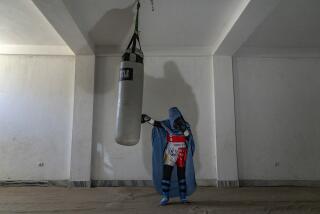Reporting through blue mesh of a burka
- Share via
PUL-I-KHUMRI, AFGHANISTAN — The old man in the front seat turned around to deliver a final admonition.
“Remember, your name is Nazu,” he said. Blinking through the blue mesh of my burka, I nodded.
But we both knew that a Pashtun name wouldn’t do me much good if we were stopped at a Taliban checkpoint -- a very real hazard on this stretch of road in northern Afghanistan.
Our route was the main highway running between two provincial capitals, precisely the kind of vital link that ordinary Afghans expect their national police to be able to safeguard. Without such a sense of safety, their faith in the government diminishes.
Lately, insurgents had been stopping cars on this part of the route and searching them, sometimes robbing the occupants. (Or worse, if they were found to have some connection to the Afghan government or the West.)
If we were stopped, I was to feign illness. And not speak. We knew that any thorough search of the car by insurgents would almost certainly result in our being seized, but we tried to ensure that a cursory check of our belongings would turn up nothing incriminating. We left laptops and satellite phones behind. My BlackBerry was under my clothes, tucked against skin.
We left at dawn, so that the final, most perilous hour of a six-hour journey would be made in full daylight. And as best we could, we tried to resemble an Afghan family unit.
Another female journalist sat with me in the back, in an identical blue burka. Our driver, atypically for him, wore a white prayer cap and traditional Afghan dress of tunic and trousers. Beside him was a Pashtun neighbor of his, an elderly, devout-looking man who had kindly agreed to ride along so we would appear less suspicious.
We used a car considerably more beat-up-looking than the one we drove in the capital. It proved realistically battered enough that after bouncing along an especially potholed stretch, we had to make a stop to tighten the lug nuts.
Our driver made certain to do that while we were still in Pul-i-Khumri, the capital of Baghlan province, not on the lonely stretch of highway that lay ahead. Our burkas shielded us from curious glances, even when the route took us through a crowded marketplace with people and livestock milling in the road, forcing us to move at a crawl. Even the gaze of one hard-eyed young man, dressed in civilian clothes, with an assault rifle slung over his shoulder, slid over us.
But we had to remember, even in the car, to avoid behavior that might give us away as Western women -- making sweeping hand gestures, for example, or gazing around in too overt a fashion. (The latter was a particularly difficult impulse to quell: You want to turn your head to look outside, because a burka, with its tiny screened opening for the eyes, allows almost no peripheral vision.)
Between the two cities, the landscape was pastoral: a sparkling river flowing fast over flat rocks, cotton fields in bloom, rounded hills, boys on donkeys. But our driver and his bearded companion were tense and silent. We drove fast. So did everyone.
Finally, we reached our destination, Kunduz city. In the relative safety of its bustling downtown, we two women lifted our veils and took deep breaths of fresh air. We didn’t want to think just yet of the drive back.
--
More to Read
Sign up for Essential California
The most important California stories and recommendations in your inbox every morning.
You may occasionally receive promotional content from the Los Angeles Times.












